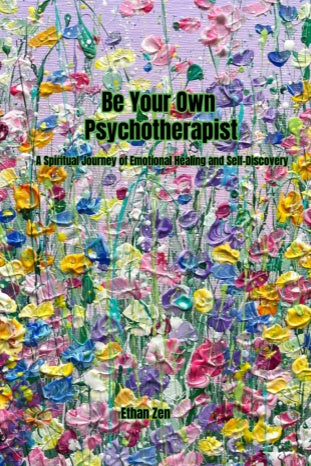Be Your Own Psychotherapist: Reframing Anxiety, Thought, and Identity
Be Your Own Psychotherapist: Reframing Anxiety, Thought, and Identity
Couldn't load pickup availability
Summary
1. Buddhism and Self-Understanding:
The study of Buddhism is essentially the study of oneself, understanding the nature of one's own mind, rather than seeking some supreme being. Buddhism emphasizes practical knowledge—wisdom—rather than dogmatic belief systems. It focuses on how to guide one’s life, integrate the mind, and maintain peace and health in everyday life.
2. Control of the Mind and Happiness:
Human beings instinctively seek happiness, whether in the East or the West. However, if the pursuit of happiness leads to emotional attachment to the sensory world, it can be dangerous. Control is not only an Eastern or Buddhist concept; everyone needs control. Especially in a materialistic life, excessive attachment to external objects leads to an unhealthy mind, even causing psychological disorders.
3. Self-Awareness and Self-Healing:
External technological and scientific advancements cannot solve emotional problems or the attachment of the mind. What Buddhist teachings offer is an understanding of human potential and the capacity of the human mind. Buddhism does not focus on supernatural belief systems but teaches methods to deeply understand oneself and all phenomena.
4. The Root of Psychological Illness:
If one does not understand the workings of their own mind, they may think they are healthy, when in reality, the deep roots of emotional afflictions and the true cause of psychological disorders are growing within them. A small external change can lead to emotional upset, which shows one is controlled by attachment to the sensory world and unaware of the true nature of their mind.
5. The Root Causes of Emotions:
Buddhist psychology describes six basic emotions—ignorance, attachment, anger, pride, deluded doubt, and distorted views—that frustrate the human mind, disturbing its peace and making it restless. Buddhism emphasizes that in order to overcome these delusions, the root cause of suffering, belief and faith are not enough; one must understand their nature.
6. Self-Investigation:
Only through introspection and wisdom can one truly understand their emotions. Simply talking about emotions or the mind does not help us realize that our fundamental emotion is egocentricity, which causes restlessness.
Buddhism's core teachings emphasize self-awareness and control over the mind to help overcome emotional attachment, thereby achieving inner peace and self-healing.
Excerpt from the original text
When we study Buddhism,we are studying ourselves,the nature of our own minds. Instead of focusing on some supreme being, Buddhism emphasizes more practical matters, such ashow to lead our lives, how to integrate our minds and how to keep our everyday lives peaceful and healthy. In other words, Buddhism always accentuates experiential knowledge–wisdom rather than some dogmatic view. In fact, we don’t even consider Buddhism to be a religion in the usual sense of the term.
From the lamas’ point of view, Buddhist teachings are more in the realm of philosophy, science or psychology.
The human mind instinctively seeks happiness. East, West– there’sno difference; everybody’s doing the same thing.But if your search for happiness is causing you to grasp emotionally at the sense world, it can be very dangerous. You have no control.
Now, don’t think that control is an Eastern thing, a Buddhist thing. We all need control, especially those of us caught up in the materialistic life; psychologically, emotionally, we’re too involved in objects of attachment. From the Buddhist point of view, that’san unhealthy mind; the person is mentally ill.
🌿 Introduction to Ven. Lama Thubten Yeshe
Lama Thubten Yeshe (1935–1984) was a highly respected Tibetan Buddhist master known for his deep wisdom, boundless compassion, and pioneering efforts in introducing Tibetan Buddhism to the Western world.
🕊️ Life and Mission
Born in Tibet in 1935, Lama Yeshe entered Sera Monastery at a young age and trained in the Gelug tradition of Tibetan Buddhism. After the political turmoil in Tibet in 1959, he fled to India, where he continued his spiritual practice. Alongside his close disciple, Lama Zopa Rinpoche, he began teaching Western students who were seeking deeper meaning and spiritual understanding.
Lama Yeshe had a unique ability to communicate profound Buddhist teachings in a clear, practical, and accessible way, tailored to modern minds and lifestyles. His approach was direct, wise, and compassionate, bridging cultural gaps between East and West.
📚 Teachings and Style
Lama Yeshe taught on essential Buddhist topics such as:
Compassion and Bodhicitta
Emptiness (Śūnyatā)
Meditation and mindfulness
Transforming emotions and daily life into the path
His teachings were later compiled into influential books, including:
Make Your Mind an Ocean
Introduction to Tantra
The Essence of Tibetan Buddhism
Wisdom Energy
His approach emphasized that:
"True spiritual practice is not about escaping reality, but about bringing compassion and wisdom into every moment of daily life."
🌍 Global Legacy
In 1975, Lama Yeshe and Lama Zopa Rinpoche co-founded the FPMT (Foundation for the Preservation of the Mahayana Tradition), an international network of over 150 centers, projects, and initiatives dedicated to preserving and spreading the teachings of Mahayana Buddhism.
🌸 A Lasting Inspiration
Lama Yeshe was not only a deeply realized teacher, but also a spiritual bridge-builder. He used universal language and gentle humor to awaken the hearts of people from all walks of life. His legacy lives on in the global community of practitioners inspired by his teachings.
Share


